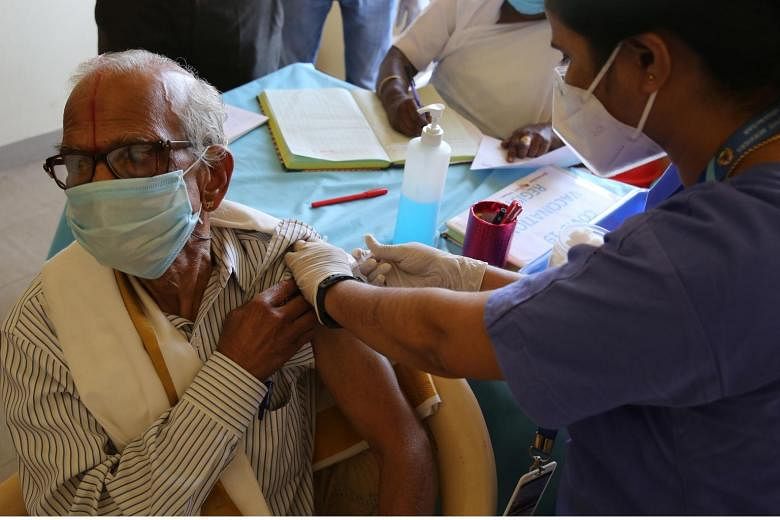BANGALORE - After nearly a year of movement restrictions and infection anxieties, millions of the elderly in India began to line up enthusiastically to get vaccinated from Monday (March 1).
But in the first week, many encountered a mystifying online appointment booking system, late delivery of vaccine vials and overwhelmed hospitals.
When 78-year-old Saraswathy Ganapathy went to get her shot on Wednesday, she did not expect to witness chaos in the waiting room.
The elderly paediatrician had waited for an hour at a Bangalore private hospital, "sitting in uncomfortable proximity" with 25 others well beyond her 8.30am appointment.
When a nurse arrived with a sheet of paper, people clambered over one another. Many of them had been turned away the previous day when the hospital ran out of vaccines. Others had given up registering online and turned up in person to try their luck.
"Why so disorganised? In the land of programming and software, shouldn't we have built a more user-friendly system?" Dr Ganapathy asked.
The shot itself, she said, was efficient, painless and over in less than a minute. She felt no side effects.
India began vaccinating its population against Covid-19 from Jan 16, starting with healthcare and front-line workers. From March 1, it invited people older than 60 and those over 45 with co-morbidities to sign up.
Prime Minister Narendra Modi, who is 70, kicked off the drive by getting vaccinated with homemade Covaxin at a Delhi hospital on Monday. Covaxin is manufactured by Hyderabad-based Bharat Biotech.
About 10,000 government centres nationwide are offering free vaccinations, and 20,000 private hospitals charge the state-fixed rate of 250 rupees ($4.57).
The Ministry of Health had first announced that the elderly could book their appointments on the CoWIN app. South Bangalore's Mrs Shakuntala Avadhani, 65, tried to do so in vain for two days, blaming herself for being inept at technology, until the ministry clarified that those getting vaccines should use the CoWIN website instead. The app was only for those administering vaccinations and government administrators.
But the CoWin website too tripped with server delays, hanging pages, and one-time-passwords that did not arrive. Even after booking, 16 out of 20 senior citizens The Straits Times spoke to said they did not get the confirmation SMSes.
It took Dr Ganapathy's daughter dozens of attempts over half a day, while Mrs Avadhani had to log in at midnight to beat the rush hour.
Health journalist Patralekha Chatterjee, 60, who went to South Delhi's Batra Hospital for her shot on Tuesday found harried medical staff uttering the tiresome lines "server is down" and "computer is hanging".
"The staff was helpless in the face of server issues," Ms Chatterjee said. She arrived at 10am for the jab and left only at 3pm. Some others simply went home.
In Kolkata, Mr Utathya Lahiri said he did not receive an SMS after he registered his 84-year-old father, and had to argue with hospital staff who refused to vaccinate without a reference number.
R. S. Sharma, chairman of the government panel for Covid vaccination admitted to "initial technical glitches" on the website, and tweeted asking for suggestions to improve it.
A surgeon in a major hospital in Mangalore said that doctors too had struggled with the same CoWIN glitches in the first phase of vaccinations in January. "It's just at a greater scale now," he said.
The elderly remain eager to gain immunity as Covid-19 infections spike in the second-worst hit country in the world. Over 2.5 million registered online for vaccination in two days.
Mr Sharat Potharaju, a Bangalore-based mobile technology entrepreneur who helped parents of his friends abroad to book appointments, said the website seemed untested for a large number of concurrent users.
"It was like booking a tatkal ticket," he joked, referring to the bewildering sight of thousands of train seats disappearing in minutes on the Indian railways' ticket booking website.
Just two days after the vaccination drive was launched, most hospitals listed in major cities showed "No available slots" until March 30.
But some, like Mr G. Subramanian, 70, in Kochi, Kerala, had a much more pleasant experience. He got an appointment on the first try, and was in and out of the hospital in barely 20 minutes.
When The Print editor Shekhar Gupta tweeted that he was vaccinated with no hiccups, dozens replied describing their own struggles and asking him for the secret to an easy appointment.
A Tamil Nadu public health official attributed the disparate experiences to the number and distribution of centres each state had allotted for vaccination - "and luck".
While getting an appointment is still akin to winning a lottery, by the fourth day, hospitals were managing the logistics better. About 1.1 million people had been vaccinated as at Thursday.
Dr Sudarshan Ballal, chairman of Manipal Hospitals, assured that the glitches would be ironed out soon, saying: "We have patiently waited a whole year for the vaccines, so we can surely wait a few more days for vaccination to become a smooth, pleasant experience."
To help the poor and computer-illiterate navigate the English-language online booking system, Tamil Nadu Health Secretary J Radhakrishnan said the state was setting up "facilitation counters".
"They would also coordinate with rural women's groups and old age homes "to arrange for cohort (group) vaccination", he said.
Additional reporting by Debarshi Dasgupta in New Delhi












